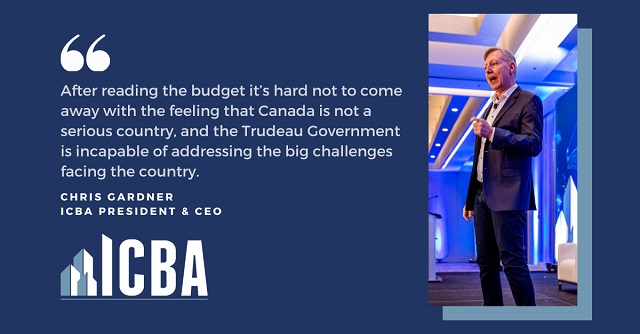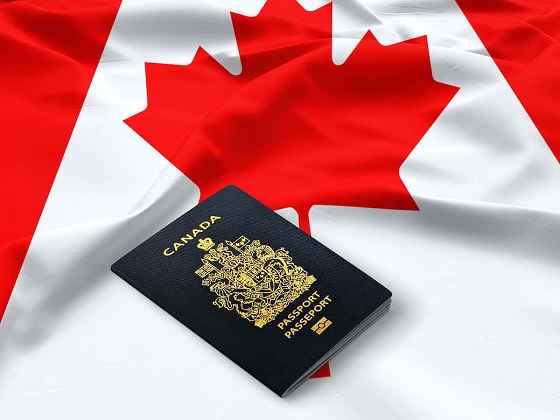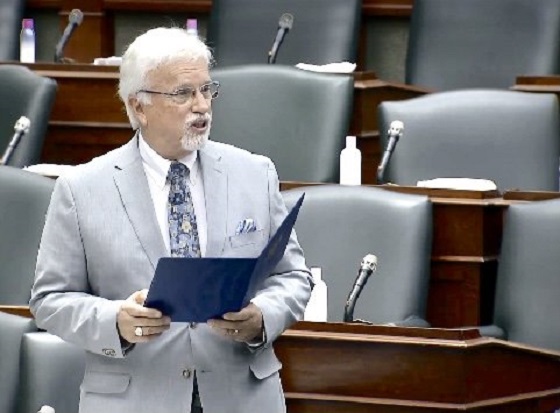Business
Doubling Down on Missing the Mark

By Chris Gardner
President, Independent Contractors and Businesses Association
Earlier this year, public opinion research company Leger published the results of a nationwide poll. One result stood out: 70 per cent of Canadians agreed with the statement: “It feels like everything is broken in this country right now.”
To young people, families and business owners struggling to buy or stay in a home, find a doctor, pay for gas and groceries, hire people, worried about how unsafe our streets have become, or having to navigate a never-ending web of red tape to get projects approved, a deep sense of helplessness has set in.
Over the past few years, Canada’s long slow decline has become the subject of an avalanche of scrutiny and by every measure of social well-being and economic competitiveness, Canada is coming up short among its global peers. Canada’s ability to generate opportunities and long-term prosperity for its people is now at serious risk.
But anyone reading the 9th budget of the Trudeau Government looking for some relief from the big challenges that Canadian families and entrepreneurs are facing, will come away sorely disappointed.
It seems that every day there is a new report telling Canadians what they already know – buying or staying in a home has never been harder in this country. Just last week, RBC reported that it is the ‘toughest time ever’ to afford a home and that the share of household income needed to cover ownership costs is now 64% in Canada and an almost inconceivable 106% in Vancouver and 85% in Toronto.
CMHC estimates that we need to build 800,000 homes a year between now and 2030 to meet demand, while CIBC says it’s closer to 1 million. Keep in mind that in 2023 we built about 230,000 new homes.
With the shortage of people across every part of our economy now acute, a central question asked by many is ‘who will build all these homes?’. Our labour markets are undergoing a seismic shift – absent immigration, our population is flat-lining and will start to decline. Indeed, in B.C., in 2022, for the first time ever, natural births exceeded natural deaths – and it happened again last year.
Part of the answer is immigration. However, our immigration system is failing us. Last year we added a city the size of Calgary to our national population, and we are on track to do the same in 2024. Two major challenges have emerged. First, we have failed miserably to assess the skills gaps in our economy – doctors, nurses, technicians, teachers and trades workers – and attract them to Canada. Case in point: only 2% of all permanent immigrants in 2023 will pursue a career in the construction trades. Second, the torrid pace of our population growth is crushing affordability and overwhelming the infrastructure in our major centres. In 2021 there was a total of 1.3MN non-permanent residents in Canada; today we have 2.6MN. We must find a better balance – attract the people with the right skills to power our economy and in numbers that our schools, hospitals, transit systems and housing stock can reasonably absorb.
Canada has a remarkable competitive advantage in its natural resources – energy and minerals in abundance and in high demand. And, harnessing them provides some of the highest paying jobs in the country. Budget 2024 offered barely a passing reference to this enormous potential for Canada. No one should be surprised. Leaders from Germany, Japan and Greece have visited Canada and received the diplomatic equivalent of a cold shoulder at the suggestion that Canada supply their economies with much needed energy. One federal minister stated that Ottawa is ‘not interested in funding LNG projects.’ He missed the point completely – no one was asking Ottawa to fund anything; they simply want Ottawa to get out of the way.
Finally, last year, the CD Howe Institute reported that for every dollar that an American business spends on training, technology and capital – the essential ingredients for innovation – a Canadian company invests 58 cents. Business investment in Canada from 2015 to 2023 ranked 44 out of the 47 most advanced economies, according to the OECD. This matters because the more innovative Canadian firms, the more they spend on upskilling their people and on adopting new technology, the more they can increase the size of paycheques for workers. Canada’s lagging productivity is to the point where the Deputy Governor of the Bank of Canada said, “You know those signs that say, ‘In an emergency, break the glass?’ Well, it’s time to break the glass.”
After reading the budget it’s hard not to come away with the feeling that Canada is not a serious country, and the Trudeau Government is incapable of addressing the big challenges facing the country.
Why do so many people feel like everything in this country is broken? Because so much is breaking all around us.
Chris Gardner is the President and CEO of the Independent Contractors and Businesses Association.
The Independent Contractors and Businesses Association (ICBA), the largest construction association in Canada, represents more than 4,000 members and clients. ICBA is one of the leading independent providers of group health and retirement benefits in Canada, supporting nearly 170,000 Canadians, and the single largest sponsor of trades apprentices in B.C. ICBA is Merit Canada’s affiliate in B.C. and Alberta. www.icba.ca
Automotive
Canadian interest in electric vehicles falls for second year in a row: survey

From LifeSiteNews
Canadians’ disinterest in electric vehicles comes as the Trudeau government recently mandated that all new light-duty vehicles in Canada are zero emission by 2035.
Research has revealed that Canadians are increasingly unwilling to purchase an electric vehicle (EV).
According to an April 22 survey from AutoTrader, Canadians remain skeptical of Prime Minister Justin Trudeau’s electric vehicle mandate and ongoing advertisement surrounding electric vehicles, as interest in owning one dropped for a second year in a row.
“Overall, while almost half of non-EV owners are open to buying an EV for their next vehicle, interest in EVs has declined for the second year in a row,” reported Tiffany Ding, director of insights and intelligence at AutoTrader.
In 2022, at least 68 percent of Canadians were interested in buying an electric vehicle. However, by 2023, the number declined to 56 percent. So far in 2024, there is even less interest, with only 46 percent saying they were open to purchasing one.
“AutoTrader data shows a direct correlation to gas prices and EV interest, and since gas prices have normalized from their peak in 2022, EV interest has also dropped,” a summary of the survey explained.
However, Canadians did show a slight increase of interest in hybrid vehicles, with 62 percent of those looking to purchase an electric vehicle saying they would look at a gas-electric hybrid, compared with 60 percent in 2023.
The survey also questioned Canadians regarding Trudeau’s Zero Emission Vehicle (ZEV) mandate, which requires all new light-duty vehicles in Canada are zero-emission by 2035, essentially banning the sale of new gasoline/diesel-only powered cars.
The mandate comes despite warnings that it would cause massive chaos by threatening to collapse the nation’s power grids.
“Over 75 percent of respondents are aware of the federal government’s ZEV mandate, which requires all new light-duty vehicles sold in Canada to be zero-emission by 2035,” the survey found.
However, the respondents revealed that they believe it’s “unlikely that Canada will be able to meet the federal government’s ZEV target due to the current inadequate charging infrastructure or a change in political power that could revoke or amend the ZEV mandate timeline.”
Canadians’ concerns in buying an electric vehicle include limited travel range/distance, inadequate availability of charging stations, higher purchasing costs, and concerns that they do not perform well in cold weather.
Indeed, this winter, western Canadians experienced firsthand the unreliability of Trudeau’s “renewable” energy scheme as Alberta’s power grid nearly collapsed due to a failure of wind and solar power.
Trudeau’s plan has been roundly condemned by Canadians, including Alberta Premier Danielle Smith. In 2022, Smith denounced a federal mandate that will require all new cars sold after 2035 to be “zero emission” electric (EVs) vehicles and promised that Albertans will always have the choice to buy gasoline-powered cars.
Since taking office in 2015, Trudeau has continued to push a radical environmental agenda similar to the agendas being pushed the World Economic Forum’s “Great Reset” and the United Nations’ “Sustainable Development Goals.”
The reduction and eventual elimination of the use of so-called “fossil fuels” and a transition to unreliable “green” energy has also been pushed by the World Economic Forum (WEF) – the globalist group behind the socialist “Great Reset” agenda – an organization in which Trudeau and some of his cabinet are involved.
The Trudeau government’s electric vehicle plan comes despite the fact Canada has the third largest oil reserves in the world. Electric cars cost thousands more to make and buy, are largely considered unsuitable for Canada’s climate as they offer poor range and long charging times during cold winters and have batteries that take tremendous resources to make and are difficult to recycle.
Business
Ottawa’s capital gains tax hike—final nail in ‘business investment’ coffin

From the Fraser Institute
By Tegan Hill and Jake Fuss
From 2014 to 2022, inflation-adjusted total business investment (in plants, machinery, equipment and new technologies but excluding residential construction) in Canada declined by C$34 billion. During the same period, after adjusting for inflation, business investment declined by a total of $3,748 per worker
According to the recent federal budget, the Trudeau government plans to increase the inclusion rate from 50 per cent to 66.7 per cent on capital gains over $250,000 for individuals and on all capital gains realized by corporations and trusts. Unfortunately, this tax hike will be the final nail in the coffin for business investment in Canada, which likely means even harder economic times ahead.
Canada already faces a business investment crisis. From 2014 to 2022, inflation-adjusted total business investment (in plants, machinery, equipment and new technologies but excluding residential construction) in Canada declined by C$34 billion. During the same period, after adjusting for inflation, business investment declined by a total of $3,748 per worker—from $20,264 per worker in 2014 to $16,515 per worker in 2022.
While business investment has declined in Canada since 2014, in other countries, including the United States, it’s continued to grow. This isn’t a post-COVID problem—this is a Canada problem.
And Canadians should be worried. Businesses investment is key for strong economic growth and higher living standards because when businesses invest in physical and intellectual capital they equip workers with the tools and technology (e.g. machinery, computer programs, artificial intelligence) to produce more and provide higher quality goods and services, which fuels innovation and higher productivity. And as firms become more efficient and increase profits, they’re able to pay higher wages, which is why business investment remains a key factor for higher incomes and living standards.
The Trudeau government’s policies—increased regulation, particularly in the energy and mining sectors (which makes Canada a relatively unattractive place to do business), higher and uncompetitive taxes, and massive federal deficits (which imply future tax increases)—have damaged business investment.
Unsurprisingly, weak business investment has correlated with a weak economy. In the fourth quarter of 2023, real economic growth per person ($58,111) officially fell below 2014 levels ($58,162). In other words, Canadian living standards have completely stagnated. In fact, over the last decade economic growth per person has been the weakest on record since the 1930s.
Instead of helping fix the problem, the Trudeau government’s capital gains tax hike will further damage Canada’s economy by reducing the return on investment and encouraging an exodus of capital from the country. Indeed, capital gains taxes are among the most economically-damaging forms of taxation because they reduce the incentive to invest.
Once again, the Trudeau government has enacted a policy that will deter business investment, which Canada desperately needs for strong economic growth. The key takeaway for Canadians? Barring a change in policy, you can expect harder times ahead.
Authors:
-

 CBDC Central Bank Digital Currency2 days ago
CBDC Central Bank Digital Currency2 days agoA Fed-Controlled Digital Dollar Could Mean The End Of Freedom
-

 Frontier Centre for Public Policy2 days ago
Frontier Centre for Public Policy2 days agoHow much do today’s immigrants help Canada?
-

 Alberta20 hours ago
Alberta20 hours agoPrincipal at Calgary Elementary School charged with possession of child pornography
-

 Fraser Institute20 hours ago
Fraser Institute20 hours agoFederal government’s fiscal record—one for the history books
-

 COVID-197 hours ago
COVID-197 hours agoFormer Canadian lawmaker has no regrets about refusing COVID shot despite losing his job
-

 Alberta15 hours ago
Alberta15 hours agoAlberta threatens to fight Trudeau government restrictions on Canada’s plastics industry
-

 Alberta19 hours ago
Alberta19 hours agoRed Deer Company fined $360,000.00 after 2022 workplace fatality
-

 Alberta7 hours ago
Alberta7 hours agoCanada’s postal service refuses to help with Trudeau’s gun ban buyback program: report









